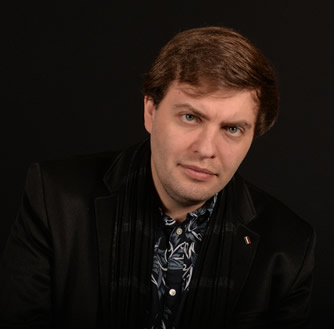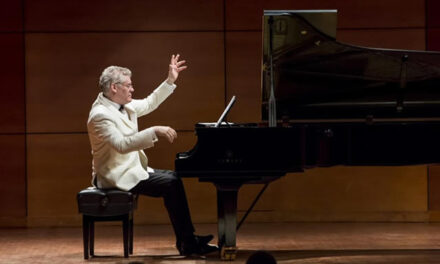The Paderewski Festival, v.6, is underway in Raleigh, and for that we must give thanks and praise to its many organizers and supporters. This year, the launch centered on a single artist, pianist Hubert Rutkowski, who graced the festival for three whole days, starting with a fascinating Raleigh Symphony program of music by Górecki, Chopin, Moszkowski, and – logically enough – Paderewski. The following evening, he offered a master class that was, by all accounts, astounding. He then concluded his formal part of the annual event – other visiting artists perform the remaining programs – with a magisterial recital in Carswell Hall* at Meredith College.
This guy is not in the beginner class: as our colleague Bill Robinson wrote in his review of the orchestral concert, Rutkowski “knows his way around the keyboard; it is no accident that he has performed in many countries and won or placed in quite a few prestigious contests. These include winning the International Chopin Piano Competition in Hannover (2007). He is now the artistic director of the Chopin Festival in Hamburg and a professor of piano and head of the piano department at the Hochschule für Musik und Theater there. So, the guy has credentials to burn, and by gum, it shows.” And there’s one thing more: he can flat-out play.
The program encompassed two fantasies – by Mozart (in D minor, K.397**) and Schumann (in C, Op. 17), a genuine obscurity by Theodor Leschetizky (1830-1915), and Chopin’s big blockbuster of a sonata, the third, in B minor, Op, 58. (The encore was Schumann’s “Der Dichter spricht,” from Kinderszenen.)
It was all impressive, but the longest-lasting memories are likely to stem from his juxtaposition of the two fantasies, for here, in the overall context of this program, the Mozart sounded positively romantic – albeit exceptionally precise and transparent – and the ruminative Schumann seemed far more closely allied to the late classicist than one might ever have imagined. Throughout, you could have heard a pin drop in the hall, had anyone been so foolish as to let one fall. Rutkowski’s playing was truly spellbinding and also elegant, deeply considered, commanding…. What wasn’t to like? Yet the response of the crowd was somewhat tame, as if the listeners were obliged to deal with what they’d heard for longer than it usually takes to process playing like this.
There was a perceived incident with the piano bench between the two pieces – clearly someone heard or observed something going on, so it was switched out before the Schumann, the mere fact of which broke some of the tension in the room, which was probably a good thing. (For reasons not altogether clear, this in turn brought to mind the famous parody review of a recital c.1967 in Hong Kong, although there was nothing whatsoever wrong with the wonderful piano in Carswell.)
Leschetizky’s Barcarolle, Op. 39, No. 1, has all the predictable attributes of music bearing this title – one feels the boat rocking gently, one hears the pull of the oar, one almost senses the salt spray. It’s a magical piece, actually, one that conjures memories of many others of its ilk. Leschetizky*** wasn’t a pupil of Chopin,**** but he dwells within that hallowed Chopin performance tradition, serving as a subsidiary link, as it were, from the first part of the 19th century into our own time through just a few generations of players. (A performance by Rutkowski is here. And here is Leschetizky himself, from a 1906 Welte-Mignon piano roll – misidentified as Op. 30….)
One wonders what his other music sounds like. Fortunately, we can find out, because there’s lots at IMSLP.
The grand finale – very grand indeed – was the great touchstone of sonatas by which all the important Chopin players tend to be measured – the famous Sonata in B minor, Op. 58. It separates men from boys, sheep from goats, amateurs from pros, etc. If OYAP (outstanding young American pianist) William Kapell set all the standards from 1951 on, Rutkowski was – is – clearly on the very same artistic wavelength. Those who’d thought the first numbers were spellbinding got further lessons in spells and their unification during the visitor’s exceptionally magnificent realization of this score – for which, let the record show, he had the music totally in his head throughout – and under his fingers, too, of course.
But what to do for an encore after that Presto, non tanto last movement? The minute-long “Poet Speaks” served as an object lesson in pianistic serenity to send us on our way.
The program notes that the concert was made possible by the Robert Lewis Endowment and the Meredith Music Department.
Next up in this festival: Tomasz Ritter in recital on Nov. 2.
*”A 175-seat intimate recital hall, Carswell Concert Hall has two Steinway grand pianos and hosts recitals, concertos, and presentations.”
**For a fascinating paper on the Mozart, click here.
***A review of an audio recording of his piano rolls is here.
****Rutkowski has recorded music of Chopin’s pupils for Naxos and Accord (the latter is out of print but available from the usual online re-sellers).












